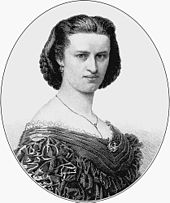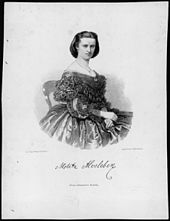Melitta Otto-Alvsleben
Henriette Melitta Otto-Alvsleben , also Melita Alvsleben , (born December 16, 1842 in Dresden ; † January 13, 1893 there ) was a German opera singer ( soprano ) and singing teacher .
Life
Alvsleben began a three-year training course at the age of 14 (1856 to the end of March 1860), first as a pianist, then as a singer at the Dresden Conservatory with Thiele.
After graduation, she made her debut on March 29, 1860, first against the opposition of the general manager of the opera Wolf Adolf August von Lüttichau , who thought she was unsuitable and initially refused to audition ten times. Nevertheless, her sponsor Julius Pabst managed to accommodate her at an audition, whereupon she was hired by Lüttichau for 400 thalers a year.
In Dresden she remained engaged as a lyric and coloratura soprano at the Dresden court theater until 1873 . Her annual salary quickly rose to 600, 1200 and 1800 thalers.
In 1866 she married Max Otto, who later became chief customs officer.
Alvsleben took part in the world premiere of the opera Der Haideschacht by Franz von Holstein on October 24, 1868 in Dresden. As a concert singer, for example, was the soprano solo of the 9th Symphony at the account of the French German war by one year shifted Beethoven - Centenary in 1871 in Bonn.
She made her foreign debut in London in 1873 when she accompanied the pianist Clara Schumann at a concert in St. James's Hall . Following the success with the St. Matthew Passion by Bach in the same year in Manchester she performed for the next two years as one of the gefragtesten oratorio soloists in England and Scotland. She gave notable concerts in the Royal Albert Hall as well as the Crystal Palace in London and at the Leeds Festival of 1874.
In 1875 Otto-Alvsleben was appointed prima donna at the Hamburg City Theater . In 1877 she returned to the Dresden Court Opera, where she worked until she stepped down from the stage in 1883 ("Friedrichstädter Nachtigall"). On the occasion of her resignation, she was made an honorary member of the Dresden Opera House (according to the city encyclopedia this should have been done as early as 1879, including Kohut).
In 1879 Otto-Alvsleben performed at the Cincinnati Music Festival.
After her resignation, she only worked as a concert and oratorio singer and as a singing teacher.
She spent her summers in Oberlößnitz , where she had an apartment. After her death, the Alvslebenplatz near the apartment was named after her. This was an honor from the Beautification Association for the Loessnitz , as it had helped them to generate financial income for their charitable activities by participating in numerous benefit concerts .
Otto-Alvsleben died in Dresden in 1893 and was buried in the Inner Neustädter Friedhof .
Otto-Alvsleben was awarded the Great Gold Medal Virtuti et ingenio .
Roles (selection)
- Anna in Hans Heiling by Heinrich Marschner
- Rowena in The Templar and the Jewess by Heinrich Marschner
- Queen of the Night in the Magic Flute by Wolfgang Amadeus Mozart
- Martha in Martha by Friedrich von Flotow
- Alice in Robert le diable by Giacomo Meyerbeer
- Eva in the Mastersingers by Richard Wagner
literature
- Adolph Kohut : The Dresden Court Theater in the Present . E. Pierson's Publishing House. Dresden & Leipzig 1888, pp. 251 f., ( Digitized version ).
- Ludwig Eisenberg : Large biographical lexicon of the German stage in the XIX. Century . Verlag von Paul List , Leipzig 1903, p. 741, ( Textarchiv - Internet Archive ).
- Frank Andert (Red.): Radebeul City Lexicon . Historical manual for the Loessnitz . Published by the Radebeul City Archives. 2nd, slightly changed edition. City archive, Radebeul 2006, ISBN 3-938460-05-9 .
Web links
- Melitta Otto-Alvsleben at Operissimo on the basis of the Great Singer Lexicon
Individual evidence
- ↑ a b c Frank Andert (Red.): Stadtlexikon Radebeul . Historical manual for the Loessnitz . Published by the Radebeul City Archives. 2nd, slightly changed edition. City archive, Radebeul 2006, ISBN 3-938460-05-9 , p. 6 .
- ↑ a b c Otto-Alvsleben, Melitta; 1842-1893
- ↑ a b c d e Melitta Otto-Alvsleben at Operissimo on the basis of the Great Singer Lexicon
- ↑ Gudrun Täubert; Frank Andert: jewelry places in Radebeul; yesterday and today . In: Association for Monument Preservation and New Building Radebeul (ed.): Contributions to the urban culture of the city of Radebeul . Radebeul 2010, p. 10 .
- ↑ Todtenschau . In: Dresdner Geschichtsblätter , Volume 1, No. 1/5, 1892/1896, p. 67 ( online ).
- ^ Address book Dresden, 1893, p. 513.
| personal data | |
|---|---|
| SURNAME | Otto-Alvsleben, Melitta |
| ALTERNATIVE NAMES | Otto-Alvsleben, Henriette Melitta (full name); Alvsleben, Melita |
| BRIEF DESCRIPTION | German opera singer (soprano) |
| DATE OF BIRTH | December 16, 1842 |
| PLACE OF BIRTH | Dresden |
| DATE OF DEATH | January 13, 1893 |
| Place of death | Dresden |


